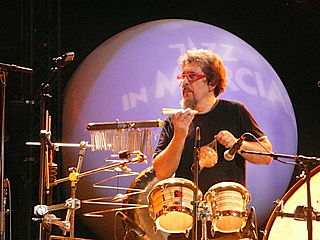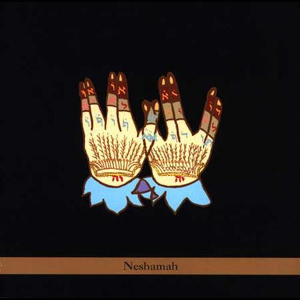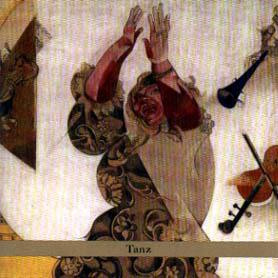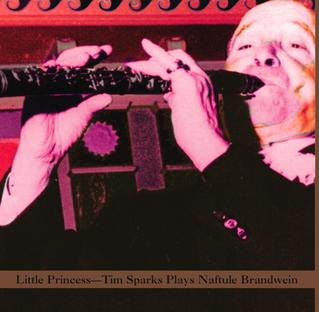
Masada is a musical group with rotating personnel led by American saxophonist and composer John Zorn since the early 1990s.

Cyro Baptista is a Brazilian-born percussionist in jazz and world music. He creates many of the percussion instruments he plays.

Tim Sparks is an American acoustic guitar player, singer, arranger and composer.

Neshamah (Songs from the Jewish Diaspora) is the first solo recording by American guitarist Tim Sparks on the Tzadik Records label. "Neshamah" means "soul" in Hebrew. The arrangements adapt Ashkenazic klezmer, Sephardic and Middle Eastern Jewish music for the solo guitar.

Tanz is the second recording by American guitarist Tim Sparks on the Tzadik Records label, released in 2000. The word טאַנץ is Yiddish for dance, cognate to the German word Tanz with the same meaning.

Beat the Donkey is an album by percussionist Cyro Baptista, which marked the debut of his rotating percussion and dance ensemble that would become known as Beat the Donkey, which was released on the Tzadik label in 2002.
Bar Kokhba Sextet brings together six core members of Masada under the leadership of John Zorn. An improvisational group of New York's downtown artists, the sextet includes Cyro Baptista on percussion, Marc Ribot on guitar, Greg Cohen on bass, Joey Baron on drums, Mark Feldman on violin, and Erik Friedlander on cello. According to Tzadik, Zorn's music label, the band's music is "Sephardic exotica for young moderns".

Filmworks VII: Cynical Hysterie Hour is a 1989 album by John Zorn featuring music written for a series of Japanese animated shorts that were created by Kiriko Kubo. It features Zorn's first music for cartoons and was originally released on the Japanese Sony label in limited numbers. In late 1996 Zorn finally attained the rights for his music and remastered and re-released the album on his own label, Tzadik, in 1997.

The Circle Maker is a double album by John Zorn featuring Zorn's Masada compositions performed by the Masada String Trio and the Bar Kokhba Sextet which was released in 1998 on the Tzadik label.

Taboo & Exile is an album by John Zorn. It is the second album to appear in Zorn's Music Romance Series following Music for Children (1998). Three of the tracks on this recording are from Zorn's Masada songbook.

Music for Children is the first release in John Zorn's Music Romance Series and features three Naked City compositions performed by Zorn with the band Prelapse; a 20-minute composition for wind machines and controlled feedback systems dedicated to Edgar Varese, and a classical chamber music piece for violin, percussion and piano performed by the Abel-Steinberg-Winant Trio framed by a poly-rhythmic etude for percussion and celeste and a lullaby for music box.

Filmworks III: 1990–1995 features the scores for film and advertisements by John Zorn. The album was originally released on the Japanese labels Evva in 1995 and Toys Factory in 1996 and subsequently re-released on Zorn's own label, Tzadik Records, in 1997. It features the music that Zorn wrote and recorded for Thieves Quartet (1993), directed by Joe Chappelle, which was performed by the group that would become Masada; nine cues for Kiriko Kubo's Music For Tsunta (1988); eleven tracks for Hollywood Hotel (1994), directed by Mei-Juin Chen; and thirty-two pieces for advertisements by Wieden & Kennedy.

Filmworks IV: S/M + More features film scores by John Zorn. The album was released in Japan on Eva Records in 1996 and on Zorn's own label, Tzadik Records, in 1997. It features the music that Zorn wrote and recorded for Maria Beatty's The Elegant Spanking, Beatty and M.M. Serra's A Lot of Fun for the Evil One, "Credits Included" written for the film of the same name directed by Jalal Toufic and "Maogai," written for a piano scene in a film by Hiroki Ryuichi.

Filmworks VI: 1996 features three scores for film by John Zorn. The album was released on Zorn's own label, Tzadik Records, in 1996. It features the music that Zorn wrote and recorded for Anton, Mailman (1996), a short film directed by Dina Waxman that was never completed due to loss of funding in its final stages, Mechanics of the Brain (1996) directed by Henry Hills and The Black Glove (1996), which was directed by, and starred, Maria Beatty.

Filmworks VIII: 1997 features two scores for film by John Zorn released on Zorn's own label, Tzadik Records, in 1998. It features the music that Zorn wrote and recorded for The Port of Last Resort (1998), a documentary directed by Joan Grossman and Paul Rosdy examining the experiences of Jewish refugees in Shanghai and Latin Boys Go to Hell (1997) which was directed by Ela Troyano.

Filmworks XII: Three Documentaries is an album containing three scores by John Zorn for documentary films released on Zorn's own label, Tzadik Records, in 2002. It features music that Zorn wrote and recorded for Homecoming (2002), a tribute documentary about the dance program at Performance Space 122 in New York by Charles Dennis, Shaolin Ulysses (2002) a film by Mei-Juin Chen and Martha Burr that follows Shaolin monks living and training in the United States, and Family Found (2002), a portrait of outsider artist Morton Bartlett which was directed by Emily Harris.

50th Birthday Celebration Volume 11 is a triple live album by the Bar Kokhba Sextet documenting their performance at Tonic in September 2003 as part of John Zorn's month-long 50th Birthday Celebration.

Cobra: John Zorn's Game Pieces Volume 2 is an album by John Zorn that includes his game piece, Cobra. The piece was recorded in previous versions by the labels HatHut, Knitting Factory, and Avant but this was the first time by Zorn's label Tzadik.

Lucifer: Book of Angels Volume 10 is an album by the Bar Kokhba Sextet performing compositions from John Zorn's second Masada book, "The Book of Angels".

Little Princess is the eighth album by guitarist Tim Sparks and his fourth on the Tzadik Records label. It is a tribute album to the music of Klezmer clarinetist Naftule Brandwein.



















